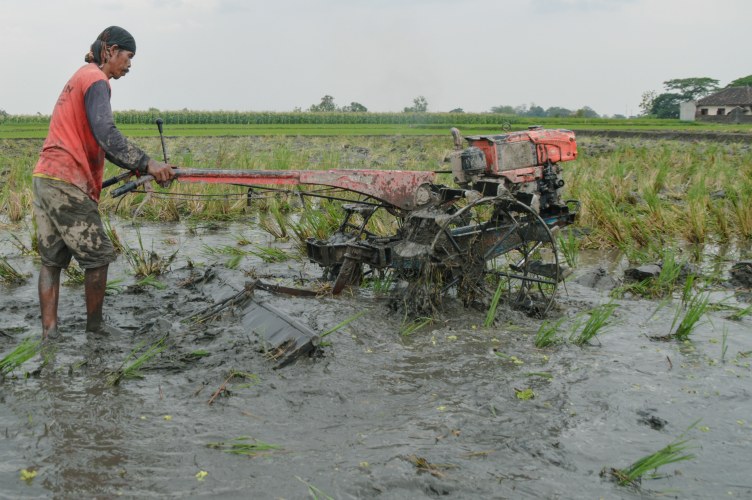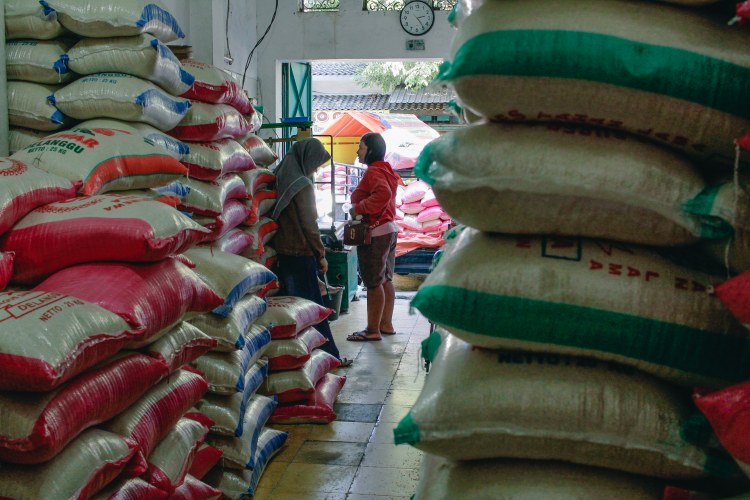Promoting sustainable and inclusive rice value chain in Indonesia
Promoting sustainable and inclusive rice value chain in Indonesia
Supporting farmers to adopt sustainable rice production
In Indonesia, a meal without rice is not truly a meal. More than 93% of families in Indonesia consume rice daily. The average Indonesian consumes about 114 kilograms of rice per year. Rice does not only hold a central place in the Indonesian kitchen and culture, it is also a crucial part of the country's economy. Indonesia is the third-largest rice-producing country, right after China and India.
Small-scale farmers produce up to 90% of Indonesia's rice. For many years, the majority of rice farmers in Indonesia have been using chemical fertilisers and rely on subsidised fertilisers from the government. As a result, they lack the knowledge on how to implement more eco-friendly practices in fertilising their crops and eliminating pests. A more sustainable production method is crucial in meeting the increasing demand for healthy and high-quality rice.
Amid growing concerns over the environmental impact of rice cultivation, Rikolto ensures that rice production benefits both farmers economically, as well as the environment. Sustainable rice production can teach farmers how to reduce their dependence on chemical products, utilise the natural resources found in their surroundings, and improve farmers' income. In addition to assisting farmers in producing organic rice, Rikolto in Indonesia also supports farmers to meet the Sustainable Rice Platform (SRP) Standard.
Promoting Sustainable Rice Platform (SRP) Standard
At a global level, Rikolto aims to strengthen the food sector to keep up with the ever-growing population in a changing climate so that it can provide affordable food for all, today and tomorrow. Rice programme in Indonesia is part of the Rikolto's Rice Cluster working to push for sustainable rice sector transformation. In its rice programmes, Rikolto wants to contribute to sustainable rice sector transformation at national, regional, and global level in order to:
- Provide safe, healthy, sustainable, and quality rice to consumers.
- Generate decent profits and jobs for all actors along the value chain, especially for smallholder farmers (men, women and youth).
- Reduce the environmental impact of rice cultivation and to preserve the environment for future generations.
To pursue these goals, Rikolto has become a member of the Sustainable Rice Platform (SRP). Rikolto actively promotes the SRP instruments and has sat on the advisory board since 2015, became a member of the Board of Directors since 2018, and take part in the development of SRP performance indicators.
In 2018, Rikolto in Indonesia conducted SRP baseline and SRP pilot surveys. We surveyed 170 farmers and followed up by an SRP pilot project involving 560 farmers. In the pilot project, farmers received training on SRP standard. The results showed that Rikolto's farmers are already in the essential stage, with a score range of 67-90 (max 100).
In Boyolali District, Central Java province, Indonesia, we assist 1,000 farmers in producing SRP rice. The Standard comprises 41 requirements structured under eight themes: farm management, pre-planting, water use, nutrient management, integrated pest management, harvest and post-harvest, health and safety, and labour rights.
Rikolto realises the importance of a multi-sectoral partnership to push this agenda forward. At a regency level, we are partnering the local government, farmer organisations, rice mill entrepreneurs and other private companies to market the SRP rice. At a national level, we work alongside other SRP members and stakeholders to sensitise SRP rice to the private and public sector, as well as take part in policymaking that supports sustainable rice.
Working with farmers' organisations
At the moment, Rikolto Indonesia is working with two associations of small-scale rice farmers: Boyolali Organic Rice Association (APOB) and Alliance of Boyolali Organic Rice Farmers (KOPAPPOLI) in Central Java's Boyolali regency. With the support of Rikolto, the cooperatives have been guiding their members to produce high-quality, healthy and organic rice sustainably. They also have obtained the necessary certificates (SNI standard) to sell their rice on national and international markets. We are also working with farmers in Klaten regency to carry out sustainable rice cultivation with SRP standards and looking to expand this model to other areas.
Critical challenges remain to be tackled, however, to make sure that every rice farmer can earn a living wage from producing premium and organic rice.
Challenges
- Regeneration of future farmers. Indonesian rice farmers are ageing. The involvement of young generation in the agricultural sector is declining due to limited farmland and because it is perceived to have little (financial) reward.
- Gender gap. Women make essential contributions to rice farming. However, they have limited decision-making capacity within the household or the farmers' organisation. Most of the cultivation process, from planting to harvesting, is done by women, while men take the decisions for selecting what rice varieties to plant and harvest.
- Climate change. The quantity and quality of rice are negatively impacted by climate change. Droughts have in the past years led to a lack of water and reduced production, and unexpected heavy rainfall affects the rice's quality. Climate change also increases the loss caused by pests and diseases.
Our strategies
- Rikolto facilitates trainings on Internal Control Systems to the farmer organisations’ boards and organises capacity building for members of the organisations.
- We support the rice farmer organisations in local rice seed breeding according to market requirements and in the production of organic fertilisers. These local seeds and organic fertilisers are sold at discount prices to members, and at market-rate prices to other rice farmers.
- Rikolto further introduces the System of Rice Intensification (SRI) model to the organisations and their farmer members, to deal with continued droughts. SRI is an organic system which implies giving rice plants more space to grow, which reduces water usage by 50% and produces drastic increases in rice production.
- Rikolto facilitates trainings on bookkeeping of stocks, milling, processing and warehousing for premium-quality rice.
- We enable rice farmer organisations to manage their businesses professionally and sustainably. This means, amongst other things:
- Supporting farmers to apply sustainable agricultural practices. There are currently more than 600 organic rice farmers as members of APOB and KOPAPPOLI.
- Supporting farmers to create more space for engagement of women and youth, through internal policies promoting their participation and through popular events such as summer camps for the district’s youngsters;
- Providing training on (online) marketing of their rice, business and organisational management, network and decision making;
- Organising capacity building activities on access to finance and supporting the development of business plans to meet the requirements of financial service providers;
- Facilitating dialogues and linkages between the rice producer organisations and buyers, both nationally and internationally, to develop business opportunities that benefit small-scale farmers.
Central Java Premium Rice Consortium meets the Central Java Governor

The Dutch Government-funded, FDOV - Central Java Premium Rice Consortium met the Central Java Governor Ganjar Pranowo at the gubernatorial residence Puri Gedeh in Semarang, on Monday (12/8), where ICCO, Rikolto, and Yayasan Jawa Tengah Berdikari as consortium members presented project achievements and sustainability.
The Consortium consists of ICCO Cooperation (lead), Rikolto Indonesia, Yayasan Jawa Tengah Berdikari, Central Java Food Security Council, PT. SMB, PT. UNS, and the Bank of Central Java.
Through the FDOV - Central Java Premium Rice Project, the consortium works to encourage public-partnerships in a bid to improve the production and marketing of premium rice in 15 districts in Central Java. Main activities in the project include:
Training farmers with Good Agricultural Practices - Agricultural Growth Promoting Inoculant (GAP – AGPI)
Developing demonstration plots
Post-harvest training and assistance
Helping joint farmers groups (Gapoktan) to have strong business organisations
Strengthening the position of women farmers in the rice value chain
The project runs from 2016 to 2019. The achievements so far:
9, 278 farmers have implemented GAP – AGPI
58 joint farmer groups have premium rice business plans
13 cooperatives are formed
Increase in farmers’ income by 30%

Helping farmers
On the meeting, the Central Java Governor appreciated the Central Java Premium Rice Consortium project for helping farmers produce premium rice and form three cooperatives in Magelang, Grobogan, and Solo Raya. To follow up the meeting, the Governor has asked his staff to work with the Consortium as to study and discuss how the achievements can be used for policy formulation.
Future direction that the Consortium wants to see and achieve is:
Involvement of private sector to ensure market for premium rice farmers
Mobile application utilisation to support marketing strategies
Scaling-up and replication of the current project
Young people-driven modern farming
Collaborating with BUMDes (Village-owned Enterprise) to develop an agro-tourism model
In 2020, around 2,684 farmers received benefits from our interventions. We work together with two associations: Boyolali Organic Rice Association (APOB) and Alliance of Boyolali Organic Rice Farmers (KOPAPPOLI).
Boyolali Organic Rice Association (APOB)


Alliance of Boyolali Organic Rice Farmers (KOPAPPOLI)


Certified Farmers

Farmers organisations have become more advanced in doing their businesses through creative marketing methods. Therefore farmers organisations can absorb their members' products to the fullest. The growing business also is shown to attract non-member farmers to get involved in the organisations, as well as lures young people and women to participate in the business and capacity-building activities.
Youth as an essential part of the rice programme has been receiving various training from rice cultivation to marketing. From some discussions conducted with young people, they shared positive experience after attending the organic youth camp. The youth camp aims to introduce sustainable agriculture system and agribusiness to young people.
Boyolali Organic Rice Association (APOB)
- APOB succeeded in getting government assistance in the form of rice mill unit in March 2019. This facility has improved APOB's business considerably. The ownership of a rice-milling unit helps APOB in full control of stock management, product development, and anticipating market needs. Rikolto facilitated APOB's access support program from the Ministry.
- In addition to having certified organic rice, APOB also sells healthy rice purchased from members who are already involved in the Internal Control System (ICS) unit. APOB recorded increased quality rice sales from 81.83 tons (2018) to 128.33 tons (2019) after activating the RMU.
Alliance of Boyolali Organic Rice Farmers (KOPAPPOLI)
- KOPAPPOLI has a broad domestic organic rice market. Buyers believe in KOPAPPOLI because it commits to producing good quality rice and timely delivery. KOPAPPOLI is also a member of the Farmers Economy Institution formed by the Boyolali District Agriculture Agency.
- In 2018, KOPAPPOLI successfully exported directly to Australia thanks to the KOPAPPOLI's close relationship with an Australian buyer.
- Due to a solid ICS owned by this organisation, KEHATI-a national NGO in Jakarta-contracted KOPAPPOLI to support setting up certification system, including ICS, for farmers in Sangihe Talaud in North Sulawesi Province.
- In addition to increasing their on-farm capacity, women also received capacity building in micro-business management. KOPAPPOLI established a business unit of rice cracker production by utilising damaged rice that is not sold by the organisation.




















